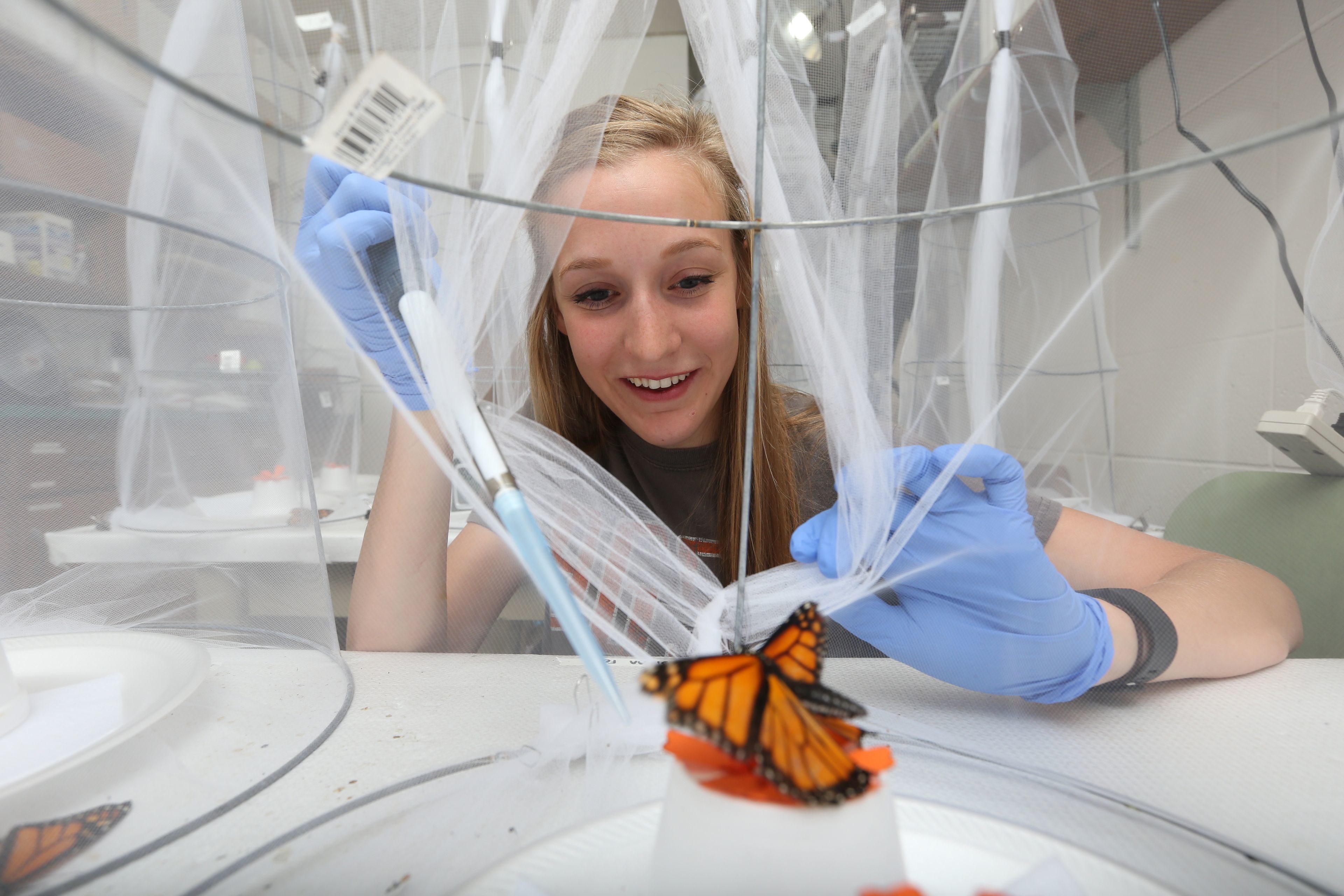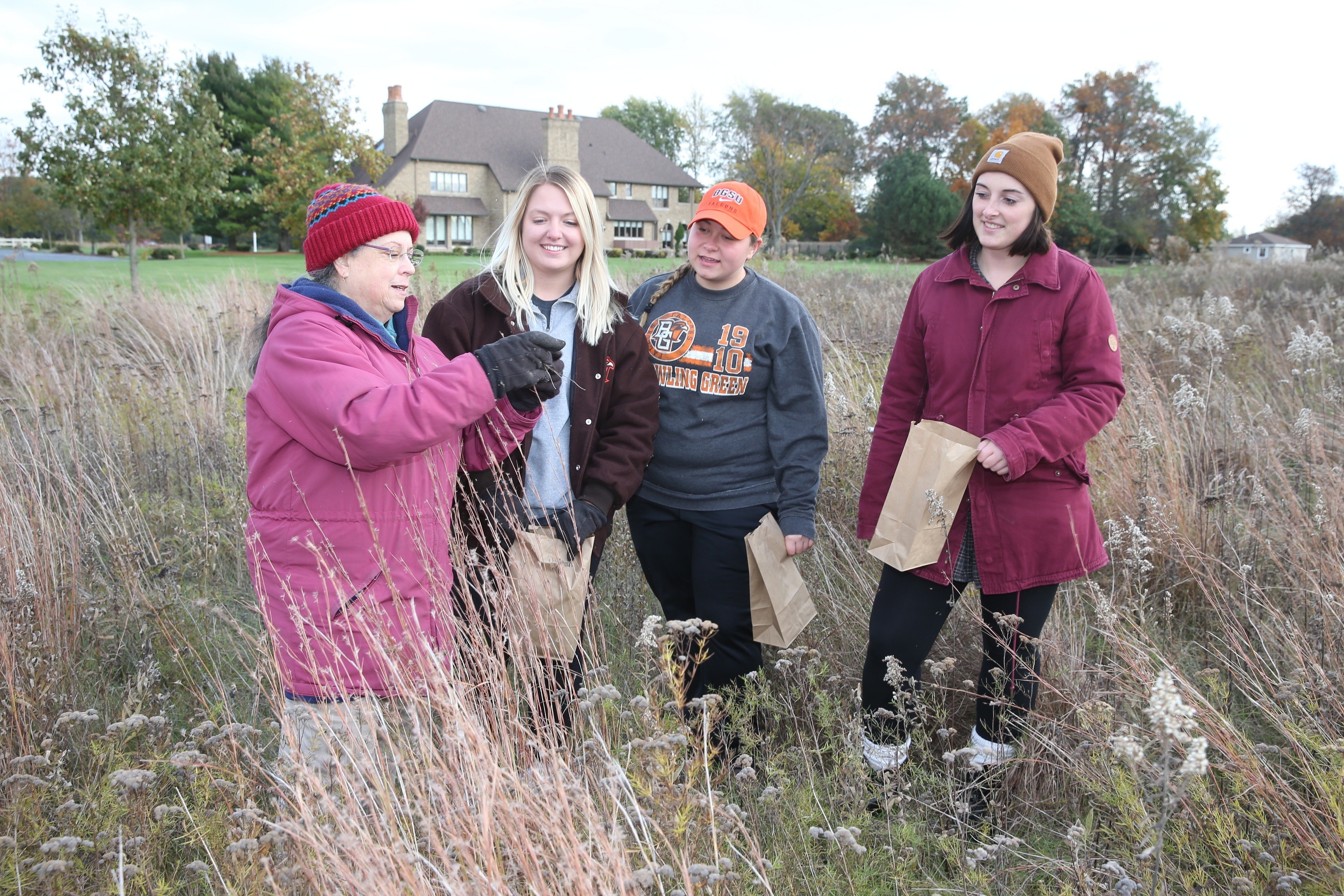Nationally recognized for student experience
The Wall Street Journal

Bachelor of Science (B.S.)
Biology: Ecology and Conservation Biology
BGSU is one of the best colleges for ecology and conservation biology. Our students graduate with impressive portfolios, making them standout candidates for competitive job opportunities in academia, government and business. They have the knowledge, skills and connections to become leaders in this vital field of science.
Ecology and conservation biology is a field for those who are deeply curious about the natural world and committed to protecting it. Ecologists and conservation biologists are key to uncovering real solutions at a time when deforestation, climate change and species extinction are accelerating at alarming rates.
In ecology and conservation biology, you’ll experience the joy of discovery, the satisfaction of hands-on work and the fulfillment of knowing you’re playing a bigger part in protecting the planet.
Graduates with a Bachelor of Science in biology with a specialization in ecology and conservation biology may directly impact species survival, restore natural ecosystems and contribute to the fight against climate change.
Why study ecology and conservation biology at BGSU in Ohio?
- Stellar reputation. Ecology and conservation biology experts in the BGSU Department of Biological Sciences have been recognized for outstanding contributions in the fields of education and research.
- Outstanding faculty. BGSU biological sciences faculty generates 50 peer-reviewed biology research publications and more than $1 million in external grants each year.
- State-of-the-art learning facilities. Most ecology and conservation biology courses are taught in the Life Sciences Building. The facility contains dozens of labs, including a greenhouse complex, a Herpetology Lab and Marine Biology Lab.
- Undergraduate research opportunities. Unlike other universities, research opportunities aren’t limited to graduate students. Undergraduate ecology and conservation biology degree majors are welcome to participate in research projects, field research studies and internships. Program strengths include:
- Microbial ecology
- Aquatic biology
- Behavioral ecology
- Landscape ecology
- Conservation biology
- Invasive species
- Population biology
- Molecular ecology
- Prime location for field work. BGSU is centered near two unique natural ecosystems (the Oak Openings savannah and the Great Lakes), BGSU is the perfect place for natural sciences research and field studies of populations, communities and ecosystems in rapidly-changing environments.
- Small class size. Class sizes are kept small to ensure high-quality, personalized instruction and mentorship opportunities.
- Collaborative learning and research. Research faculty from numerous disciplines collaborate on projects at multiple levels of the biological hierarchy, from molecules and populations to communities and landscapes. Our research and teaching program incorporates cutting-edge techniques – molecular genetics, theoretical modeling, GIS and remote sensing – to address basic and applied questions in ecology and conservation biology.
- Close colleague connections. The BGSU Alpha Beta chapter of Tri-Beta (Beta Beta Beta National Biological Honor Society) connects biological sciences students through research symposiums, nature walks, local science fairs, independent research projects, guest lectures, internship panels and tutoring services.
The BGSU Life Sciences Building is a 5-story, 120,000-square-foot research and teaching complex. It houses over 40 laboratories for students, faculty/researchers and community education.
#1 public university in Ohio for career prep
The Wall Street Journal
Career - what can you do with an ecology conservation biology degree?
This isn’t a passive profession. Although there are many niches you can pursue, those with a specialized biology degree in ecology and conservation are likely to work in immersive settings., Your work is likely to bring you in direct contact with the natural world – whether you’re studying the behavior of endangered wildlife in their natural habitats or analyzing the impacts of climate change across the globe. For many, that’s the best part of the job!
- Conservation scientists and ecologists often work for government agencies to develop strategies to protect biodiversity and restore damaged ecosystems.
- Some are employed as environmental consultants, helping businesses and governments implement more sustainable practices, such as lowering their carbon footprint or preserving wetlands and natural resources.
- Others are drawn to education, sharing what they’ve learned as park rangers, science teachers, public health advisors.
- A fair amount also end up in academia, teaching at the university level and conducting groundbreaking research that may shape environmental policy.
The job outlook for environmental scientists is expected to grow 7% faster than the national average for other career fields, according to the U.S. Bureau of Labor Statistics.
Career paths
- Water quality research scientist
- Ecological research
- Wildlife ecologist
- Conservation and restoration ecologist
- Natural resource manager
Quick Facts from the Bureau of Labor Statistics
The median annual wage for environmental scientists is 23% higher than the national average for all occupations.
U.S. Bureau of Labor Statistics
Curriculum
Ecology and conservation biology is a specialization within the Bachelor of Science in biology program that lays a strong foundation for students interested in pursuing an ecological career.
Start with the basics in biology, genetics, ecology, evolution and conservation biology. Grasp underlying patterns and processes that influence biodiversity at numerous scales and understand the complex relationships between organisms and their environments.
Focus on coursework in biodiversity, organismal biology, GIS and statistics. Develop specialized quantitative, analytical and technical skills essential for leadership roles and advanced study. Expand your knowledge with elective courses in areas of ecology and biodiversity, acquiring specialized training needed to address pressing environmental problems.
BGSU faculty and administrators guide students in taking advantage of opportunities for independent research, experiential learning and internships.

Sample courses
- Evolution
- Ecology
- Conservation Biology
- Restoration Ecology
- Wildlife Biology
- Genetics
#1 university in Ohio – big or small, public or private – students would choose again
The Wall Street Journal
The Bachelor of Science biology program with an ecology and conservation biology specialization is part of the Department of Biological Sciences in the BGSU College of Arts and Sciences.
Accreditation
Bowling Green State University [BGSU] is accredited by the Higher Learning Commission. BGSU has been accredited by the Higher Learning Commission since 01/01/1916. The most recent reaffirmation of accreditation was received in 2022-2023, with our next reaffirmation of accreditation scheduled for 2032-2033. Questions should be directed to the Office of Institutional Effectiveness.
Request Information
Updated: 04/28/2025 10:01AM

